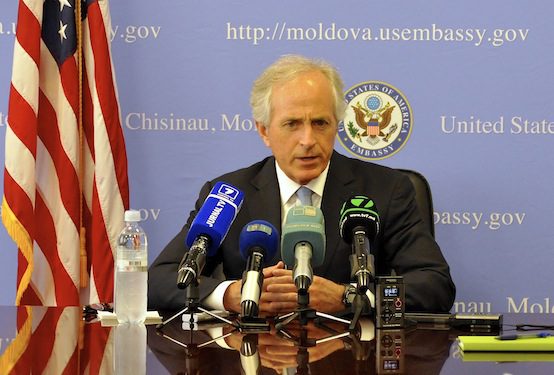Can a GOP Majority Handle Foreign Policy?

With the party united, the odds are now at least even that the GOP will not only hold the House but also capture the Senate in November. But before traditional conservatives cheer that prospect, they might take a closer look at the foreign policy that a Republican Senate would seek to impose upon the nation.
Specifically, they should spend time reading S. 2277, the “Russian Aggression Prevention Act of 2014,” introduced by Sen. Bob Corker on May 1, and endorsed by half of the Senate’s GOP caucus. As ranking Republican on the foreign relations committee, Corker is in line to become chairman, should the GOP take the Senate. That makes this proposal a gravely serious matter.
Corker’s bill would declare Moldova, Georgia, and Ukraine “major non-NATO allies” of the United States, move NATO forces into Poland, Lithuania, Latvia, and Estonia, accelerate the building of an ABM system in Eastern Europe, and authorize U.S. intelligence and military aid for Ukraine’s army in the Donbass war with Russian-backed separatists. U.S. aid would include antitank and antiaircraft weapons.
S. 2277 would direct the secretary of state to intensify efforts to strengthen democratic institutions inside the Russian Federation, e.g., subvert Vladimir Putin’s government, looking toward regime change. If Putin has not vacated Crimea and terminated support for Ukraine’s separatist rebels within seven days of passage of the Corker Ultimatum, sweeping sanctions would be imposed on Russian officials, banks and energy companies, including Gazprom. Economic relations between us would be virtually severed.
In short, this is an ultimatum to Russia that she faces a new Cold War if she does not get out of Ukraine and Crimea, and it is a U.S. declaration that we will now regard three more former Soviet republics—Moldova, Ukraine, and Georgia—as allies.
A small, weak country might accept this dictation from a superpower. But Russia, where anti-Americanism is virulent and rampant and the Russian people support Putin’s actions in Ukraine, would want him to tell the Americans just what to do with their ultimatum. And how Russia would respond is not difficult to predict.
Our demand that she get out of Crimea and leave her two-century-old naval base at Sevastopol in the custody of President Petro Poroshenko in Kiev and his U.S. allies, would be laughed off. Putin would tell us that Crimea has voted to return to Russia. It’s ours, and we’re going to keep it. Now deal with it.
To make good on our latest red line, we would have to start shipping weapons to Kiev, in which case Russia, with superior forces closer, would likely move preemptively into East Ukraine. What would our NATO allies do then?
The U.S. directive to the State Department to work with NGOs in Russia, blatant intervention in the internal affairs of a sovereign nation, would be answered with a general expulsion of these agencies from Moscow. We would not sit still for this kind of open subversion in the United States. What makes us think they would?
And where do we come off telling the Russians what kind of government they may have? Do we do that with our friends in Saudi Arabia and Kuwait? Is there more freedom in Egypt, to which we send billions annually in foreign aid, than in Russia? Is there more freedom in China?
How do we think Beijing would respond if Corker & Co. openly declared not only their right but their intent to funnel U.S. funds to civic organizations to bring about an end to single-party Communist rule? The Russian people, today backing Putin by 80 percent, seem happier with their government than we Americans do with ours.
But it may be this idea of installing a ballistic missile defense, an ABM system, in Poland and the Czech Republic, that is most dangerous of all. Putin has already signaled that this would cross his red line, that if we start implanting antimissile missiles in Eastern Europe, he will reply by installing offensive missiles.
The Reagan-Gorbachev INF treaty to eliminate all intermediate-range nuclear missiles from Europe—the USSR’s triple-warhead SS-20s, and our Pershing II and cruise missiles—could wind up in the dumpster. We could have a mini-Cuban missile crisis in Eastern Europe. And how would our German allies react to Russian missiles rising in Kaliningrad, the former Prussian capital of Konigsberg, wedged between Lithuania and Poland?
Russia and Ukraine have been like Siamese twins for a thousand years. When did where and how they separate become our strategic concern? Under Obama, the U.S. has declined to intervene in civil wars in Syria, Ukraine, and Libya, or to go back in force in Iraq. He is pulling us out of Afghanistan. The American Imperium is folding up. Retrenchment is underway.
If the Republican counteroffer to Obama’s is a return to the compulsive interventionism of Bush II, this is where some of us will be getting off.
Patrick J. Buchanan is the author of the new book “The Greatest Comeback: How Richard Nixon Rose From Defeat to Create the New Majority.” Copyright 2014 Creators.com.
Comments